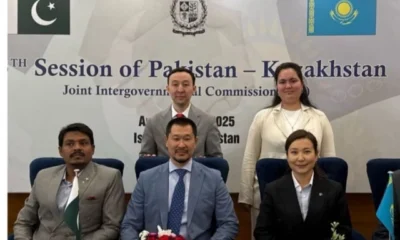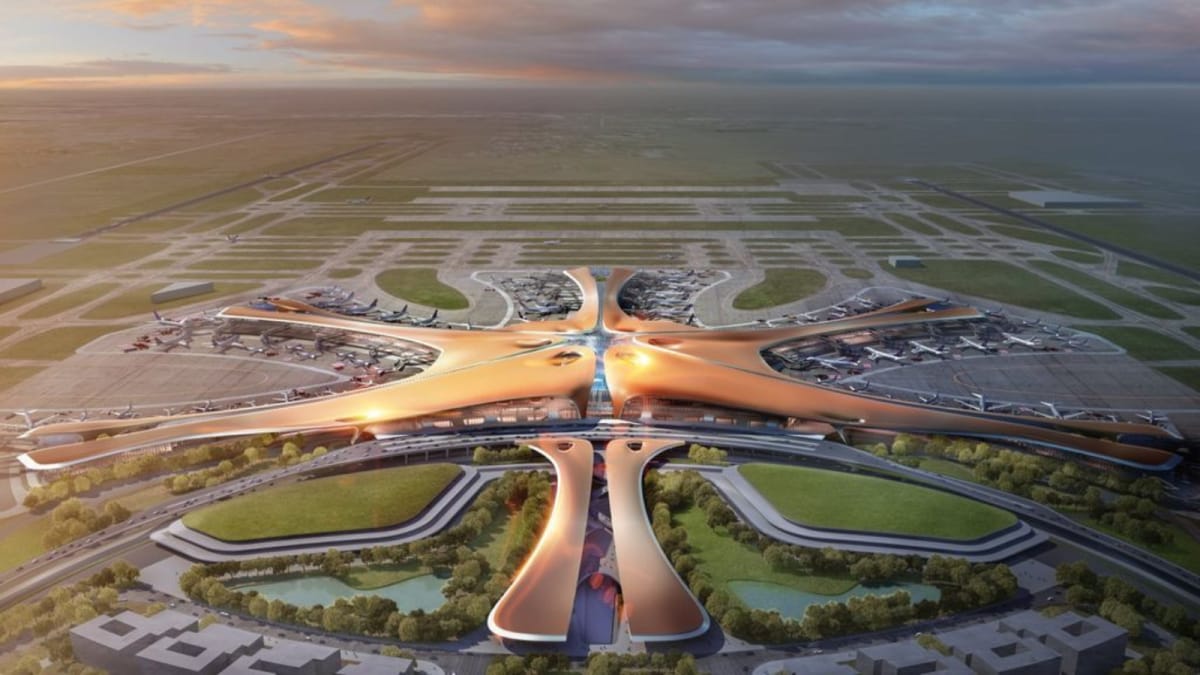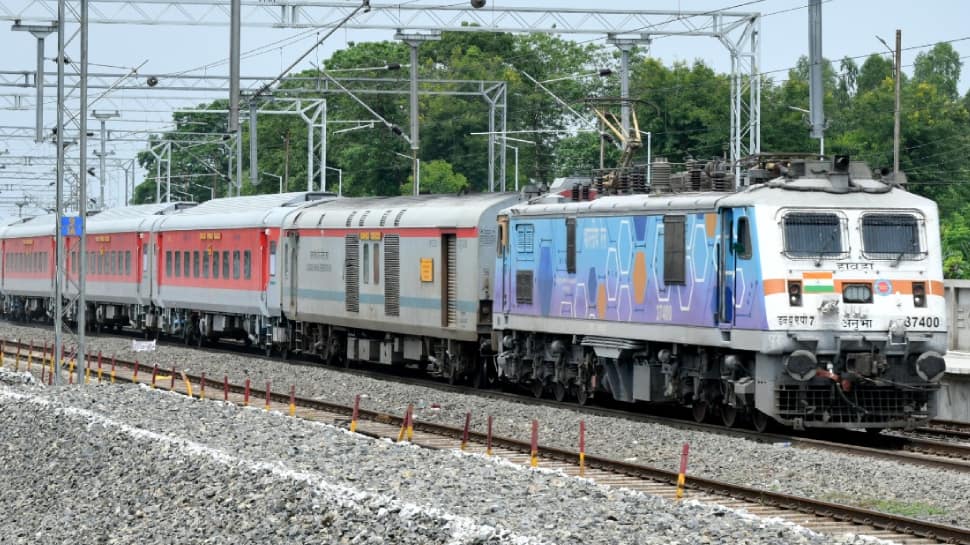Business
PM Modi Inaugurates Navi Mumbai International Airport – Parking For 350 Aircraft, Spread Over 2866 Acres And More

Mumbai: Prime Minister Narendra Modi inaugurated Phase 1 of Navi Mumbai International Airport (NMIA) on Wednesday, which will be one of India’s most modern and eco-friendly airports. A new greenfield airport, spread over 1,160 hectares, is being developed at a cost of Rs 19,650 crore. The domestic flight operations are expected to commence in the first week of December 2025, followed by international operations in further two months.
The work on one of the airport’s two runways has been completed. All terminals will be connected through an integrated system, providing improved passenger convenience. For passenger convenience, direct check-in at the metro station and baggage service will be provided through the ‘One-Up End-to-End Baggage Facility’ app.
With environmental protection in mind, the airport has placed special emphasis on green energy and water conservation. The terminal will showcase Indian culture through digital art, while artificial intelligence (AI) technology will be used in various operational processes.
To improve connectivity, a new road is being constructed from Atal Setu to Kosthal Road. Metro Line 8 will also be approved soon, connecting both Navi Mumbai and Mumbai airports. Additionally, a water taxi service will be launched soon.
The airport has parking facilities for 350 aircraft and separate taxiways for both runways. The entire project will be completed in four years. The opening of Navi Mumbai International Airport will significantly increase the air traffic capacity of the Mumbai Metropolitan Region and will emerge as a symbol of India’s progressive development.
According to the NMIA fact sheet, the airport will handle 90 million passengers per annum and the cargo of 3.25 million metric tonnes per annum after it is fully completed. The NMIA is spread over 1160 hectares (2866 acres). Phase one facilitates providing 20 million passengers per annum and 0.5 million metric tonnes of cargo capacity. The airport’s ownership is held by Navi Mumbai International Airport Ltd, comprising MIAL (74 per cent) and CIDCO (26 per cent). The Director General of Civil Aviation granted an Aerodrome Licence to NMIA on September 30.
NMIA and Chhatrapati Shivaji Maharaj International Airport together form a multi-airport system for the Mumbai Metropolitan Region, establishing an aviation hub with a combined ultimate passenger capacity of up to 150 million passengers per annum. NMIA will ease congestion and elevate Mumbai into the league of global multi-airport systems.
Business
Budget 2026: Punjab, Telangana flag higher fiscal burden under VB-G RAM G; seek more central funds – The Times of India

Opposition-ruled states Punjab and Telangana on Saturday sought additional fiscal support from the Centre in the Union Budget 2026-27, arguing that the proposed Viksit Bharat Guarantee for Rozgar and Ajeevika Mission (Gramin) (VB-G RAM G) will place a heavier financial burden on states due to its revised cost-sharing formula, PTI reported.The demands were raised at the pre-Budget meeting chaired by Union Finance Minister Nirmala Sitharaman, which was attended by finance ministers of states and Union Territories, along with Union Minister of State for Finance Pankaj Chaudhary. The meeting also saw participation from the Governor of Manipur, chief ministers of Delhi, Goa, Haryana, Jammu and Kashmir, Meghalaya and Sikkim, and deputy chief ministers of several states, including Telangana.Opposition-ruled states said the changes to the rural employment framework weaken the employment guarantee and go against the spirit of cooperative federalism.Parliament last month passed the VB-G RAM G Bill, replacing the two-decade-old Mahatma Gandhi National Rural Employment Guarantee Act (MGNREGA). Under the new scheme, the Centre will bear 60 per cent of the cost and states 40 per cent, compared with the 90:10 funding pattern under MGNREGA.Punjab Finance Minister Harpal Singh Cheema strongly opposed the proposed changes, saying the new framework dilutes the employment guarantee while shifting a significant financial burden to states.“Proposed MGNREGA changes weaken employment guarantee and burden states,” Cheema said at the meeting, calling for the restoration of the original demand-driven structure and funding pattern of the scheme.Telangana Finance Minister Mallu Bhatti Vikramarka said the Union government had replaced MGNREGA with VB-G RAM G without consulting states. He noted that the shift from a 90:10 to 60:40 funding ratio would further strain state finances.He also pointed out that any additional man-days beyond the normative allocation would now have to be borne by states, which would create a serious obstacle in providing demand-based work to job seekers.“This is entirely against the spirit of cooperative federalism and starving them of funds for capital outlay, which is essential for maintaining growth momentum,” Vikramarka said.The Telangana finance minister also suggested that surcharges on income tax and corporation tax be credited to a non-lapsable infrastructure fund, from which states could receive grants for infrastructure development. Alternatively, he said, surcharges should be merged with basic tax rates to expand the divisible pool of central taxes.On GST reforms, Vikramarka said GST 2.0 may boost demand but questioned its sustainability, warning that states’ revenues could fall due to rate reductions. He called for a suitable mechanism to compensate states for any revenue loss.Punjab also sought a special fiscal package, citing the “double whammy” of border tensions and floods in 2025. On GST, Cheema said Punjab is facing an annual revenue loss of nearly Rs 6,000 crore following GST 2.0 and pressed for a predictable GST stabilisation or compensation mechanism for states.
Business
Export credit boost: Banks clear Rs 3,362 crore under CGSE in first month; 774 exporters covered – The Times of India

Lenders have sanctioned Rs 3,361.83 crore to 774 applicants under the Rs 20,000-crore Credit Guarantee Scheme for Exporters (CGSE) within a month of its rollout, as the government steps up support for exporters facing headwinds from steep US tariffs, official data showed as reported PTI.The scheme, approved by the Union Cabinet on November 12 and made operational from December 1, 2025, provides 100 per cent credit guarantee cover by the National Credit Guarantee Trustee Company Ltd (NCGTC) to member lending institutions (MLIs) for extending additional credit facilities of up to Rs 20,000 crore to eligible exporters, including MSMEs.“Applications worth Rs 8,764.81 crore (1,840 applications) received, out of which Rs 3,361.83 crore (774 applications) sanctioned by the lenders” till January 2, 2026, the Department of Financial Services (DFS) under the finance ministry said in a statement.Implemented by the DFS, the CGSE aims to enable banks and financial institutions to extend additional financial assistance to Indian exporters during a period of external trade uncertainties, helping them diversify markets and enhance global competitiveness. The scheme will remain valid till March 31, 2026, or until guarantees worth Rs 20,000 crore are issued, whichever is earlier.The DFS also highlighted progress under the Mutual Credit Guarantee Scheme for MSMEs (MCGS-MSME), which offers credit guarantees to incentivise MLIs to provide additional credit facilities of up to Rs 100 crore to MSME borrowers for the purchase of plant, machinery and equipment. As of December 2025, banks have sanctioned Rs 16,836 crore against 8.96 lakh applications under the scheme.Sharing broader banking sector performance, the DFS said scheduled commercial banks (SCBs) recorded their highest-ever aggregate net profit of Rs 4.01 lakh crore. Public sector banks (PSBs) posted a record aggregate net profit of Rs 1.78 lakh crore in 2024-25, while their net profit stood at Rs 0.94 lakh crore in the first half of 2025-26.Global deposits and advances of PSBs rose to Rs 146.27 lakh crore and Rs 114.85 lakh crore, respectively, in September 2025, compared with Rs 71.95 lakh crore and Rs 56.16 lakh crore in March 2015.The gross non-performing assets (GNPA) ratio of PSBs declined to 2.30 per cent (Rs 2.65 lakh crore) in September 2025, down from 4.97 per cent (Rs 2.79 lakh crore) in March 2015 and a peak of 14.58 per cent (Rs 8.96 lakh crore) in March 2018. The capital adequacy ratio of PSBs improved by 451 basis points to 15.96 per cent in September 2025 from 11.45 per cent in March 2015.
Business
Gen Z and social media are helping men’s makeup go mainstream. The beauty industry is trying to capitalize

Pixdeluxe | E+ | Getty Images
It often starts small.
A dab of concealer. A tinted moisturizer. Maybe a brow gel that goes from borrowed to bought. For many men, like Daniel Rankin, makeup has transformed from something taboo into a tool to make them look less tired and more put together.
“I remember thinking, ‘Am I really doing this?'” Rankin, a 24-year-old advertising agent from New York who likes to shop at Sephora, told CNBC. “But once I tried it, it just became normal.”
In front of bathroom mirrors and in gym locker rooms, more men are now adding cosmetics to their routines, industry experts told CNBC. The men’s makeup market is now one of the most lucrative — and largely untapped — growth opportunities left in beauty, and specialty retailers like Ulta Beauty and Sephora along with big-box companies like Target and Walmart all see opportunity.
“Men’s beauty is one of the last categories left where brands can likely still see easy double-digit growth potential simply by showing up,” said Delphine Horvath, professor of cosmetics and fragrance marketing at the Fashion Institute of Technology.
Men’s grooming sales in the United States topped $7.1 billion in 2025, up 6.9% year over year, according to market research firm NielsenIQ. The global market was valued at $61.6 billion in 2024 and projected to surpass $85 billion by 2032, with the biggest growth driven by the skin-care sector, according to Fortune Business Insights.
Much of the momentum is coming from Gen Z.
In the U.S., 68% of Gen Z men ages 18 to 27 used facial skin-care products in 2024, a sharp jump from 42% just two years earlier, according to data from market intelligence firm Mintel.
“This is no longer niche,” said Linda Dang, CEO of Canada-based Asian beauty retailer Sukoshi. “Men are forming routines, that usually starts at skin care and then expands further, they are no longer just buying random products. That’s what makes this market so valuable.”
Bloomberg | Bloomberg | Getty Images
Unlike one-off grooming purchases, makeup encourages repeat use and experimentation. A man who starts with concealer often adds primer, setting powder or tinted SPF over time, said Farah Jemai, global marketing associate lead at beauty brand Unleashia.
“When men discover makeup that works, they don’t use once and never again,” Jemai told CNBC. “They restock.”
Market researchers estimate that in 2022, about 15% of U.S. heterosexual men ages 18 to 65 were already using cosmetics and makeup, while another 17% said they would consider it, according to Ipsos. Industry experts say those figures are likely higher in 2026.
Openness to cosmetics has grown, as the share of U.S. men who say they never wear makeup has fallen from more than 90% in 2019 to about 75% in 2024, Statista survey data show.
Retailers cater to men
Beauty conglomerates and startups alike are responding to the growth in men’s beauty.
Ulta Beauty and and Sephora have begun integrating men’s complexion products into gender-neutral, skin care-first displays rather than having “Men’s” aisles. Those gender-specific displays can feel intimidating or stigmatizing to some men, Horvath said.
Big-box retailers like Walmart and Target have also expanded their men’s cosmetics or grooming offerings.
For example, in 2025, Target partnered with online streaming collective AMP, Any Means Possible, to launch TONE. The men‑forward personal care brand debuted in Target stores nationwide in July, leveraging AMP’s massive Gen Z male following across YouTube and Twitch.
Online — where much of the growth and discovery is happening — many beauty brands are pouring money into influencer partnerships to increase engagement and sales on TikTok Shop and Amazon.
“So many brands are now putting most of their marketing budget into influencer marketing to meet people where they already are online and make it easier to click ‘buy,'” said Janet Kim, a vice president at K-beauty brand Neogen.
Others are leaning into digital education to teach men what different items do.
The brand War Paint sells makeup products like concealer pens, tinted moisturizers and anti-shine powders that feature QR codes on the packaging. Scanning them launches video tutorials explaining what each product does — without forcing customers to ask questions in a store.
“The biggest barrier isn’t price, it’s uncertainty,” Dang said. “Men want to know what a product does and how to use it without feeling awkward.”
But the path to mass adoption isn’t guaranteed.
Industry analysts warn that social stigma remains high and inflation threatens to curb spending on experimental, nonessential goods. Retailers also face a steep learning curve: It is difficult to scale a market when the core customer doesn’t know how to use the product.
Target’s SoHo store has an eye-catching “Beauty Bar” that shows off fragrances, makeup items and more.
Courtesy of Target
The emergence of men’s makeup
While men have worn makeup for centuries, from ancient Egypt to Elizabethan England, the modern commercial men’s makeup movement traces its roots to the mid-2010s.
In 2016, CoverGirl made history by appointing then 17-year-old YouTuber James Charles as its first-ever “CoverBoy,” placing a male face on a mass-market cosmetics brand for the first time.
Still, beauty conglomerates largely focused on women until recently, Sukoshi’s Dang said. Now, a broader cultural reset around masculinity is taking place and companies are racing to monetize it, FIT’s Horvath said.
Social media has been the single biggest accelerant, Dang said.
On TikTok and Instagram, male creators post step-by-step makeup routines, product breakdowns and before-and-after results that often emphasize subtle changes rather than dramatic looks. Hashtags tied to men’s grooming and makeup have amassed billions of views, with #mensgrooming alone surpassing 26 billion views on TikTok.
“TikTok democratized the ‘how-to,'” said Dang. “You don’t have to ask your sister or guess anymore. You just scroll, see a guy who looks like you fixing his acne in 30 seconds, and click ‘buy.’ It removed the gatekeepers.”
Gen Z men are also more comfortable rejecting rigid gender categories and more skeptical of marketing that frames products as inherently masculine or feminine, Horvath said.
At the same time, makeup has increasingly been folded into a broader wellness and optimization culture — sometimes referred to as “looksmaxxing” — that includes fitness tracking, supplements, hair-loss prevention and longevity routines.
“Many men have started framing grooming and, for some, makeup as maintenance, not vanity,” Horvath said. “That reframing removes stigma and unlocks spending.”
Celebrity influence has further accelerated adoption, with stars like Harry Styles, Brad Pitt and Dwayne “The Rock” Johnson launching their own skin care and makeup brands, mirroring the trend of celebrity saturation largely seen in spirits.
Johnson’s brand Papatui, which launched at Target in 2024 and spans skin, hair, body and tattoo care, was created in response to ongoing questions about his grooming regimen. It now competes directly with legacy names like Clinique, L’Oréal and Kiehl’s.
CoverGirl James Charles
Source: COVERGIRL
Moving ahead
As the market matures, a debate is forming: Do men want “men’s makeup,” or do they just want makeup?
Horvath said there is a “bifurcation” in how companies are marketing their products.
Brands like War Paint and Stryx argue that men need products designed for their thicker, oilier skin, and packaged in masculine, tool-like containers that feel at home in a gym bag.
But Gen Z consumers are increasingly gravitating toward gender-neutral brands like LVMH co-owned Fenty Beauty, The Ordinary and Haus Labs. For them, labels that say “For Men” can feel outdated or even patronizing, Horvath said.
“In ten years, I don’t think we’ll be talking about ‘men’s makeup’ anymore,” Horvath said. “We will just be talking about makeup. The gender binary in beauty is dissolving, and the sales data is finally catching up to the culture.”
-

 Sports6 days ago
Sports6 days agoVAR review: Why was Wirtz onside in Premier League, offside in Europe?
-

 Entertainment3 days ago
Entertainment3 days agoDoes new US food pyramid put too much steak on your plate?
-

 Entertainment3 days ago
Entertainment3 days agoWhy did Nick Reiner’s lawyer Alan Jackson withdraw from case?
-

 Politics3 days ago
Politics3 days agoUK says provided assistance in US-led tanker seizure
-

 Sports6 days ago
Sports6 days agoSteelers escape Ravens’ late push, win AFC North title
-

 Politics6 days ago
Politics6 days agoChina’s birth-rate push sputters as couples stay child-free
-

 Sports6 days ago
Sports6 days agoFACI invites applications for 2026 chess development project | The Express Tribune
-

 Business6 days ago
Business6 days agoAldi’s Christmas sales rise to £1.65bn











